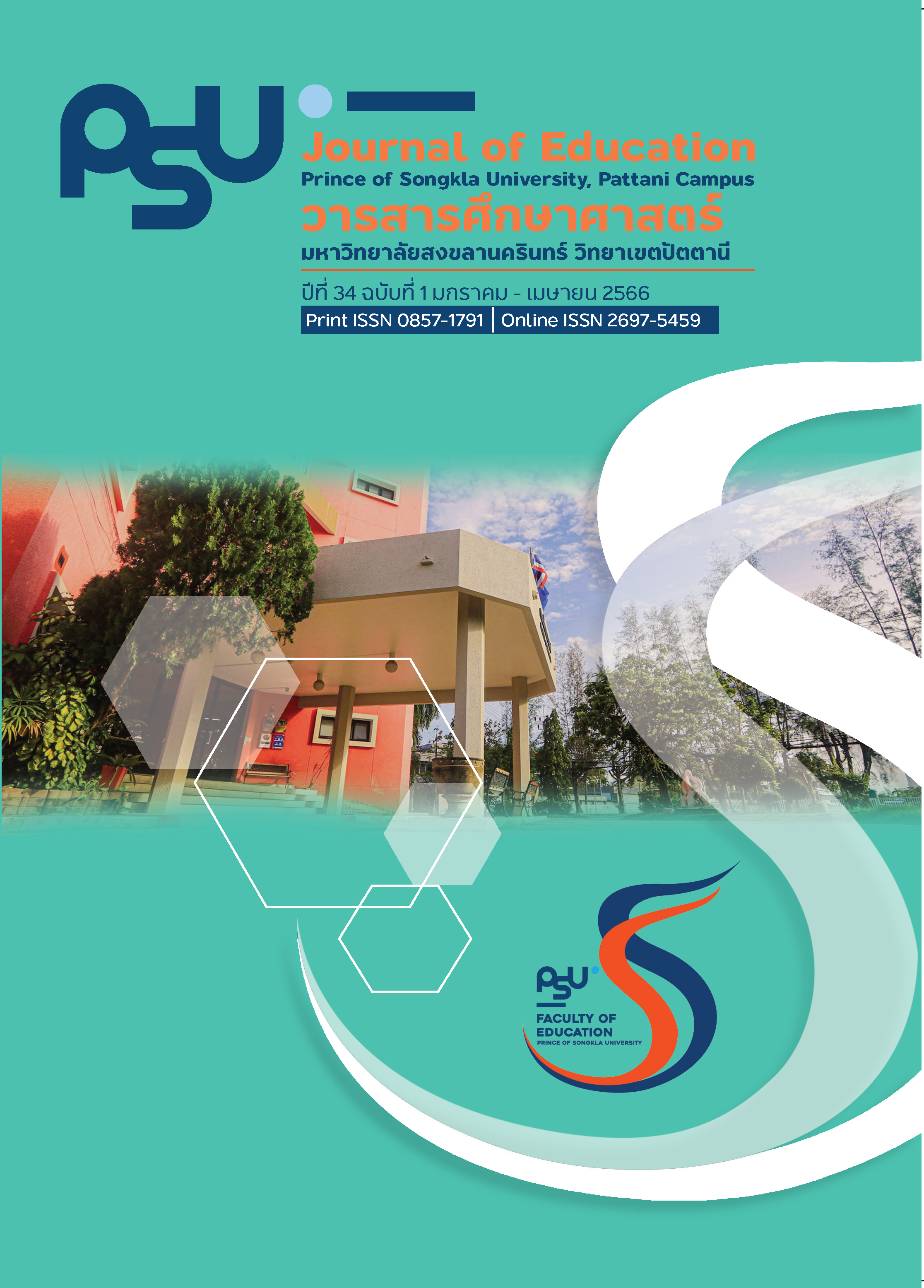การพัฒนาแบบวัดสมรรถนะครูด้านการจัดการเรียนรู้ตามมาตรฐานวิชาชีพครูของนักศึกษาครูที่มีการตรวจให้คะแนนแบบพหุวิภาค
Main Article Content
บทคัดย่อ
การวิจัยครั้งนี้มีวัตถุประสงค์เพื่อหาคุณภาพของแบบวัดสมรรถนะครูด้านการจัดการเรียนรู้ตามมาตรฐานวิชาชีพครูของนักศึกษาครูที่มีการตรวจให้คะแนนแบบพหุวิภาค ตัวอย่างที่ใช้ในการวิจัย คือนักศึกษาครูชั้นปีที่ 5 จำนวน 400 คน ผู้วิจัยทำการสุ่มตัวอย่าง โดยวิธีการสุ่มตัวอย่างหลายขั้นตอน ได้แก่ ขั้นตอนที่ 1 สุ่มมหาวิทยาลัย โดยใช้วิธีการสุ่มแบบแบ่งชั้น ขั้นตอนที่ 2 สุ่มนักศึกษา โดยใช้วิธีสุ่มอย่างง่าย เครื่องมือที่ใช้ในการวิจัย คือแบบวัดสมรรถนะครูด้านการจัดการเรียนรู้ตามมาตรฐานวิชาชีพครูของนักศึกษาครูที่มีการตรวจให้คะแนนแบบพหุวิภาคสถิติที่ใช้ในการวิเคราะห์ข้อมูล ได้แก่ พารามิเตอร์ของแบบวัด ค่าอำนาจจำแนก (α) ค่าความยากง่าย (β) และค่าสารสนเทศของแบบวัดด้วย Grade response model ผลการวิจัยพบว่า คุณภาพของแบบวัดสมรรถนะครูด้านการจัดการเรียนรู้ตามมาตรฐานวิชาชีพครูของนักศึกษาครูที่มีการตรวจให้คะแนนแบบพหุวิภาค การตรวจสอบคุณภาพของแบบวัดตามทฤษฎีการตอบสนองข้อสอบแบบพหุวิภาค ค่าอำนาจจำแนกรายข้อ (α) อยู่ระหว่าง 0.08 ถึง 1.58 ส่วนค่าความยากง่าย (β) ของแต่ละรายการคำตอบ มีค่าเรียงลำดับจากน้อยไปมากทุกข้อ และค่าสารสนเทศของแบบวัดมีความเที่ยงเท่ากับ 0.791 สำหรับค่าฟังก์ชั่นสารสนเทศของแบบวัด สามารถวิเคราะห์ข้อคำถามได้ดีในช่วง θ ระหว่าง -2.0 ถึง +1.0 หรืออาจกล่าวได้ว่า แบบวัดสมรรถนะครูด้านการจัดการเรียนรู้ สามารถนำไปใช้กับนักศึกษาครู ที่มีสมรรถนะด้านการจัดการเรียนรู้ ในระดับต่ำถึงปานกลาง
Article Details

อนุญาตภายใต้เงื่อนไข Creative Commons Attribution-NonCommercial 4.0 International License.
เอกสารอ้างอิง
Chutworakitpanich, W. (2003). The Development of a Management Skills Test for Vocational. Bangkok: Students. Chulalongkorn University. [in Thai]
Darling –Hammond, Lind a. (2000). “Teacher quality and student achievement: A review of state policy evidence.” Education Policy Analysis Archives, 8(1), 12-23.
Eakwannang, W. (2017). Development of Teaching Professional Competency Assessment Module for Pre-service Teachers of Rajabhat University. Research and Development Journal SuanSunandha Rajabhat University, 2017 (2), 119-131. [In Thai]
Hair, J.F., Black W.C., Babin B.J., Anderson R.E. & Tatham R.L. (2006). Multivariate data analysis. (6th ed.). Pearson Prentice Hall: New Jersey
Jarungnuntakan, S. (2013). The Development of a Package for Evaluating the Competency of Mathematics Teachers in Lower Secondary School. [Degree of Doctor, Srinakharinwirot University]. Srinakharinwirot University. Bangkok. [In Thai]
Kanjanawasee, S. (2007). Modern Test Theories. (3rd ed.). Bangkok: Chulalongkorn University Press. [In Thai]
Kanjanawasee, S. (2013). Classical Test Theorie. (7th ed.). Bangkok: Chulalongkorn University Press. [In Thai]
Ministry of Education. (2010). National Education Act B.E. 2553. (No. 3). Bangkok: Siam Sport Syndicate. [In Thai]
Nunnally, J. C., & Bernstein, I. H. (1994). Psychometric theory. (3rd ed.). New York, NY: McGraw- Hill. Company Limited.
Office of the Higher Education Comimission. (2009). Thai Qualifications Framework for Higher Education. Bangkok: Office of the Higher Education Commission, Ministry of Education. [in Thai]
Secretariat Office of the Teachers Council. (2019). Details of Standards of Knowledge and Professional Experience of Teachers According to The Teachers Council of Thailand Regulations on Professional Standards (No. 4) B.E.2562. https://www.ksp.or.th/ksp2018/2018/11/1811. [in Thai]
Seekhieo, D. (2006). The Development of a System to Evaluate Practice Teaching Students Based On 360 Degree Feedback by Applying Generalizability Theory. [Degree of Doctor, Chulalongkorn University]. Chulalongkorn University. Bangkok. [in Thai]
Taengchuan, P. (2008). Educational Personnel Competency Development Model. Bangkok: OffSet Creation. [In Thai]
Thongnak, S. (2013). Development of a Competency Test for Student Teachers Based on Teaching Professional Standards Using Polytomous Scored Item. [Degree of Doctor, Chulalongkorn University]. Chulalongkorn University. Bangkok. [in Thai]
Thomas, Murray R. (1981). Educational Personnel Inefficiency in Developing Nations - Causes and Solutions. Paris: UNESCO.
Ulrich, D. (2006). The HR Valve proposition: A dozen things we know about organizations. www.rbl.net


